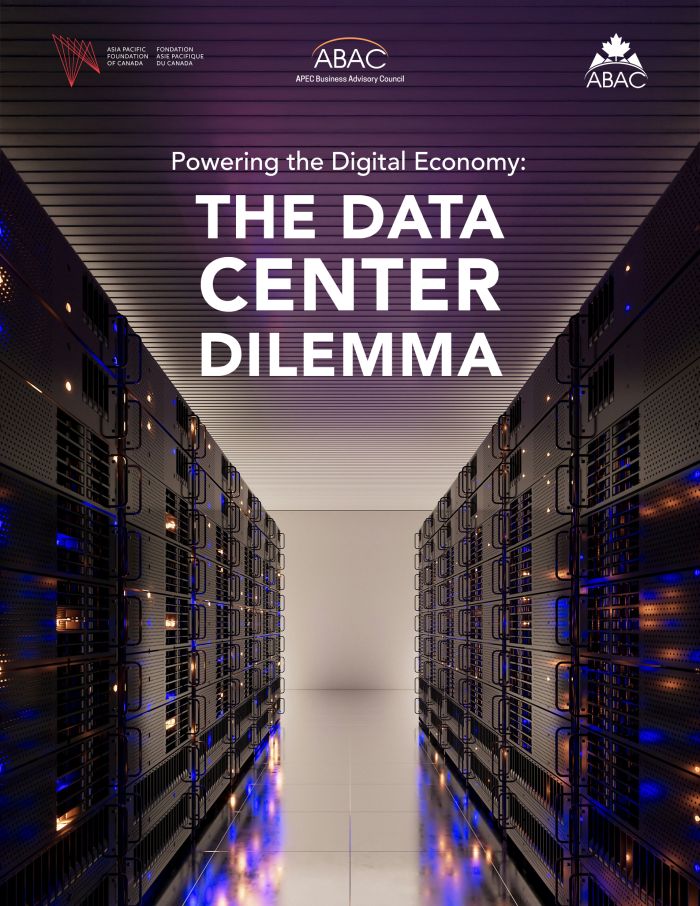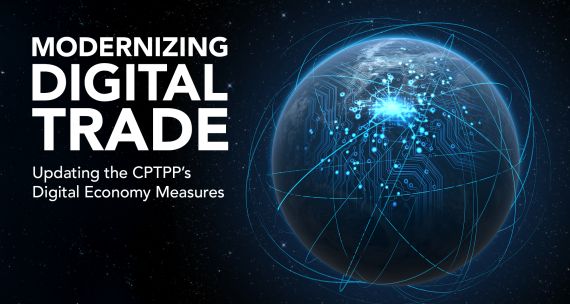The Asia Pacific Foundation of Canada, on behalf of ABAC Canada, is pleased to launch Powering the Digital Economy: The Data Center Dilemma report, commissioned by the APEC Business Advisory Council (ABAC).
As APEC economies deepen their digital transformation, the Republic of Korea’s APEC 2025 key priority — “Building a Sustainable Tomorrow: Connect, Innovate, Prosper” — reinforces the imperative to integrate sustainability, innovation, and regional equity into the foundations of digital infrastructure. Data centers are now a cornerstone of the digital economy, driving opportunity and growth while testing how effectively the region can align technological advancement with sustainability goals.
Across the 21 APEC economies, the digital boom continues to intensify — and so do the demands on electricity systems. More than 95% of global internet traffic passes through data centers, and a single AI supercluster can consume as much power as a city like Vancouver or central Kuala Lumpur. The challenge is significant — but so is the momentum for change.
This report highlights emerging best practices across the region: from clean energy corridors and advanced grid co-ordination to renewable procurement, nuclear power resurgence, waste heat reuse, and green building standards.
By aligning energy and digital planning, advancing clean power procurement, and harmonizing regional standards, APEC can turn the “data center dilemma” into an opportunity for leadership — building a digital economy that is innovative, resilient, and sustainable.
ABAC Canada/APF Canada is grateful for the sponsorship and support from the APEC Business Advisory Council, and to ABAC Canada Member Jan De Silva for her leadership. APF Canada serves as the Canadian Secretariat for the APEC Business Advisory Council.
Key Findings
- Digital Equity: Data center growth is uneven. The United States and China together hold about 70% of global capacity, while emerging APEC economies lag far behind. This gap limits participation in the digital economy and investment opportunities.
- AI and Electricity Demand: AI workloads are reshaping the energy landscape. While data centers currently account for about 1.5% of global electricity use, their impact within APEC is far more concentrated, representing 4% of national demand in the United States, 5% in Australia, 7% in Singapore, and an exceptional 26% in Virginia, the region’s major data hub.
- Energy Mix and Decarbonization: APEC economies start from vastly different baselines when scaling their data center sectors — shaped by disparities in energy self-sufficiency, electricity generation mix, and land availability. Because data centers require round-the-clock, stable power, many APEC economies continue to depend on fossil fuels for reasons of reliability, cost, and limited policy flexibility. By 2035, roughly two-thirds of additional electricity generation for data centers across the region is expected to come from fossil fuel sources.
- The Grid Constraints: Data centers move fast — but energy infrastructure doesn’t. One in five planned data center projects worldwide is now at risk due to grid constraints, highlighting the urgent need for synchronized digital energy infrastructure planning.
- The Efficiency Plateau: Gains in energy efficiency are no longer keeping up with the scale of AI-driven data center growth. While advances in cooling systems, low-power chips, and optimized server utilization offer clear pathways for improvement, high capital costs and slow technology adoption remain persistent barriers. Waste heat reuse remains a largely missed opportunity, and fragmented metrics and inconsistent standards across APEC economies continue to undermine regional efficiency efforts.
- The Policy Innovation: Since 2020, many APEC economies have launched national strategies for AI and the digital economy, but timelines, policy scope, and regulatory enforcement vary widely. Emerging tools such as long-term clean Power Purchase Agreements, demand-response participation, and regional clean-energy corridors are helping align digital expansion with sustainability and grid resilience.
The Data Center Dilemma report calls on policymakers and industry to collaborate in building sustainable digital infrastructure — from data centers and computing capacity to the power and water systems that support them — ensuring innovation and climate goals advance together. It encourages APEC economies to integrate digital infrastructure into energy planning, adopt global sustainability standards, and set ambitious, measurable targets for green data centers to drive the next phase of sustainable digital growth.
Note: This report was commissioned by the APEC Business Advisory Council (ABAC) and is therefore only available in English, the official working language of APEC.




